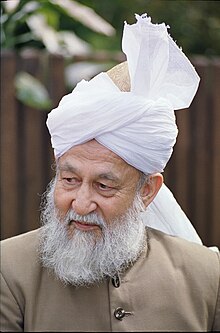Our website is made possible by displaying online advertisements to our visitors.
Please consider supporting us by disabling your ad blocker.
Mirza Tahir Ahmad
This article has multiple issues. Please help improve it or discuss these issues on the talk page. (Learn how and when to remove these messages)
|
Mirza Tahir Ahmad | |
|---|---|
مرزا طاہر احمد | |
 Mirza Tahir Ahmad in 2000 | |
| Title | Caliph of the Messiah Amir al-Mu'minin |
| Personal life | |
| Born | 18 December 1928 |
| Died | 19 April 2003 (aged 74) London, England |
| Resting place | Mubarak Mosque, Tilford, England |
| Spouse | Asifa Begum (m. 1957–1992) |
| Children | Four |
| Parents |
|
| Religious life | |
| Religion | Islam |
| Denomination | Ahmadiyya |
| Consecration | 10 June 1982 |
| Muslim leader | |
| Post | Caliph |
| Predecessor | Mirza Nasir Ahmad |
| Successor | Mirza Masroor Ahmad |
| Part of a series on
Ahmadiyya |
|---|
 |
Mirza Tahir Ahmad (مرزا طاہر احمد; 18 December 1928 – 19 April 2003) was the fourth caliph (Arabic: خليفة المسيح الرابع, khalīfatul masīh al-rābi) and the head of the worldwide Ahmadiyya Muslim Community. He was elected as the fourth successor of the founder of the community, Mirza Ghulam Ahmad. He was elected on 10 June 1982, the day after the death of his predecessor, Mirza Nasir Ahmad.
Following the Ordinance XX that was promulgated by the government of Pakistan in 1984, which prohibited Ahmadi Muslims from any public expression of the Islamic faith, Tahir Ahmad left Pakistan and migrated to London, England, provisionally moving the headquarters of the community to the Fazl Mosque in London.[1] He is noted particularly for his question and answer sessions which he held regularly with people from around the world and for his Quranic discourses. Under his leadership, there was an acceleration in the number of Quran translations produced by the Community; and during his caliphate, the Community experienced structural and financial growth on an international level, including the launch of the first Muslim satellite television network, Muslim Television Ahmadiyya in 1994 through which he could communicate televised messages to the Community globally and have his sermons and other public engagements transmitted throughout the world through this medium.[2]
Tahir Ahmad also authored many books including, Some Distinctive Features of Islam; Christianity: A Journey from Facts to Fiction; Murder in the Name of Allah, and his magnum opus[3] Revelation, Rationality, Knowledge & Truth.
- ^ "Khilafat".
- ^ Moon, Farzana (12 January 2015). No Islam but Islam. Cambridge Scholars. p. 163. ISBN 9781443874045. Retrieved 20 September 2015.
- ^ Buckley, David. Where the Waters Meet: Convergence and Complementarity in Therapy and Theology. Karnac Books. p. 75.
Previous Page Next Page


